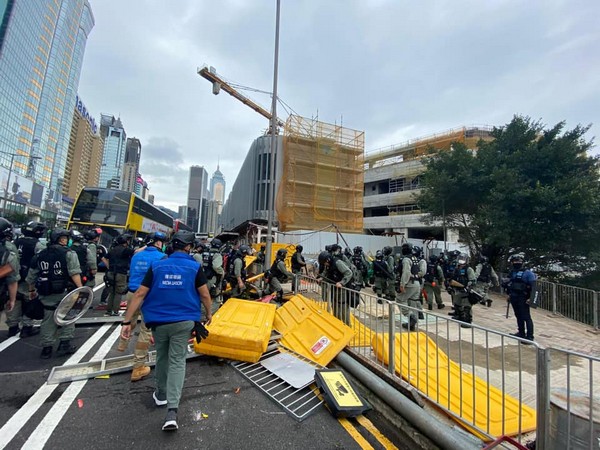Activists believe Beijing's proposed national security law will snatch away Hong Kong of its independent rights
Beijing's endorsement of a national security law tailoring Hong Kong from acts of secession, subversion, terrorism or conspiring with foreign influences, activists believe, will soon lead to an imposition of arbitrary detentions and crackdowns on free speech and dissent like in mainland China.

- Country:
- China
Beijing's endorsement of a national security law tailoring Hong Kong from acts of secession, subversion, terrorism, or conspiring with foreign influences, activists believe, will soon lead to an imposition of arbitrary detentions and crackdowns on free speech and dissent like in mainland China. In an interview with Germany's Deutsche Welle News, a Hong Kong-based barrister Wilson Leung said the fear is that Beijing will use the new law to suppress peaceful resistance, opposition and activism in the same way authorities right now in mainland China oppress dissidents.
The so-called subversion is one of the criminal offenses listed under the law. Notable cases in mainland China prosecuted under this charge include the late civil rights activist Liu Xiaobo, pastor Wang Yi, and the human rights lawyer Wang Quanzhang. Now many activists in Hong Kong are very afraid that they could be similarly prosecuted, he added. Under the new national security law, the Hong Kong government will also be required to allow agencies based in mainland China to operate in the city.
The semi-autonomous region enjoys a level of civil liberties and autonomy not seen elsewhere in China under a mini-constitution called the Basic Law. Opponents of the proposed legislation from Beijing told the German newspaper that the law represents a significant erosion of these rights, especially freedom of speech. When asked about Beijing's assertion on the law that it is necessary to fight terrorism in the state, Leung said, "What we are seeing here is the well-known instrumentalization of buzz words like 'terrorism' and 'national security' for the oppression of civil rights."
UN special rapporteurs on human rights have repeatedly told Beijing about the danger of overextending Hong Kong's existing anti-terrorism laws. Despite the existing legal measures already in place in Hong Kong for fighting terrorism, the leadership in Beijing, and Hong Kong's chief executive, think it is necessary to pass this restrictive security law with the justification of a supposed terrorist threat. It is easy to see that this is just a facade.
"And in light of Beijing's actions against the Uighur minority in the north-western Xinjiang province under these auspices, I find this very concerning," he was quoted further by the newspaper as saying. One of the biggest fear, the activist further opined, is that the new law won't be a subordinate to mechanisms protecting human rights enshrined in Hong Kong's current legal system. It is also unclear whether complaints about abuse of the security law will be allowed to be heard in Hong Kong courts, he noted.
"After all, officials from mainland China are supposed to the responsible application of the new security law. Will they be arrested and interrogated by Hong Kong officials if someone complains? I think that is very unlikely," he said. "The big question is whether the new security law will be fully enacted outside the jurisdiction of Hong Kong's existing legal system. If the Standing Committee in Beijing says it is, then Hong Kong courts will no longer be able to intervene," he added.
On Thursday, Chinese Premier Li Keqiang said that the passage of new law, which due to come into effect from January next year, is for the long term prosperity and stability of the city-state.
(This story has not been edited by Devdiscourse staff and is auto-generated from a syndicated feed.)
- READ MORE ON:
- Hong Kong
- Beijing
- China
- Liu Xiaobo
- Wang Yi
- Germany
- Li Keqiang
- UN
- Xinjiang
- Uighur
ALSO READ
Germany has legalised possession of small amounts of cannabis. But the buzz may not last
Soccer-Number four on Germany jerseys to be redesigned over Nazi symbolism
Germany withdraws soccer jerseys with number 44 because of Nazi symbolism
Germany could spend up to 9 bln euros more on defence from 2028, minister says
Rich and retired: the boom beneficiaries who finance Germany's far right










